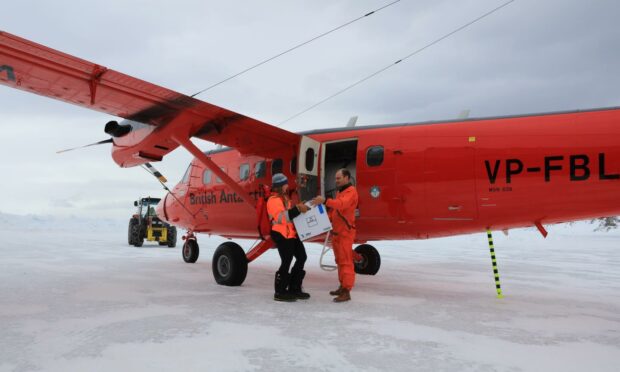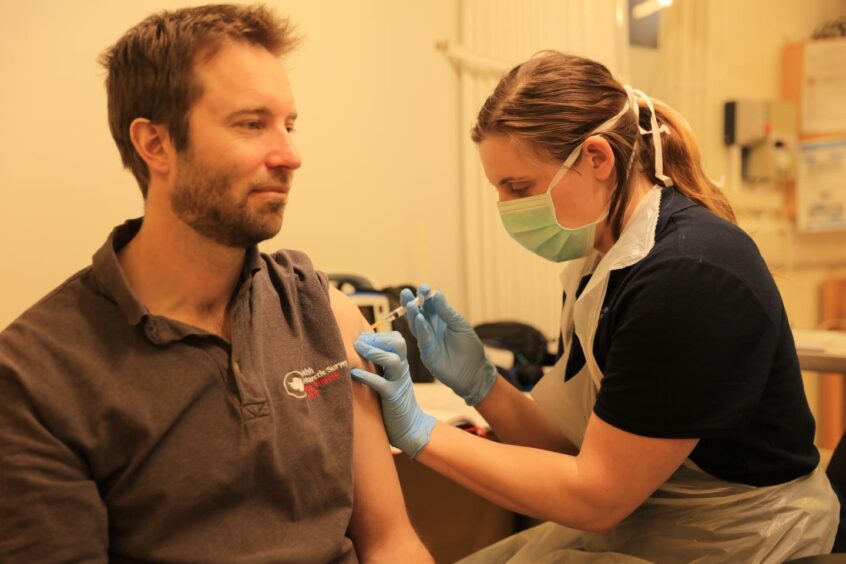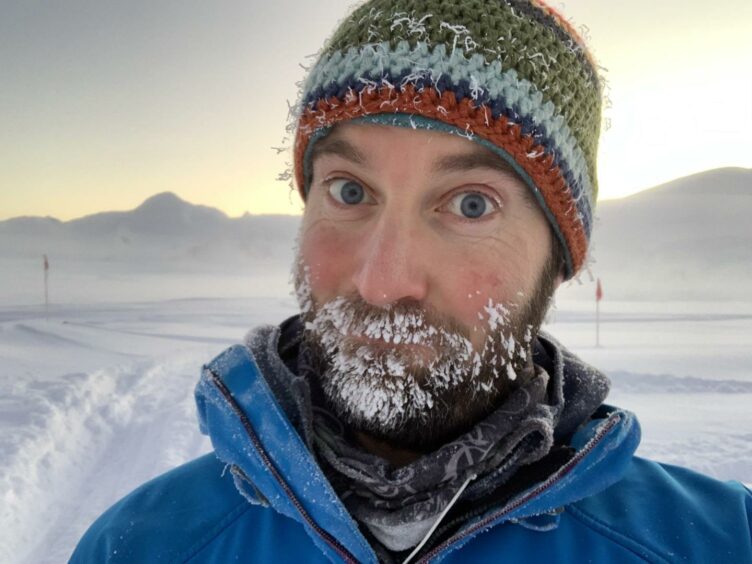A Fort William scientist working near the South Pole in Antarctica is among the last Brits to finally receive a Covid jab.
A supply of the Astra Zeneca vaccine took a trip of more than 9,000 miles to reach the British Antarctic Survey team.
Based in the Rothera Research Station, the team were some of the last Brits to be offered a Covid vaccine.
The vaccines were flown from RAF Brize Norton, in Oxfordshire, to Dakar, Senegal and on to the Falkland Islands, before finally arriving in the Antarctic.
Their arrival marked the first aircraft to have visited the team in 205 days. It also brought the first fresh vegetables they have seen for five months.
Matthew Phillips, who lives in Fort William, is winter station leader at the base. He was glad that his vaccine was administered indoors.
He said: “We’re the last Brits to get our Covid vaccine – but there was no way we’d have been rolling our sleeves up outside.
“We might just have got through 205 days of winter and into spring, but the temperature is still around -4C outdoors, so it’s still a bit chilly.”
Keeping Antarctica Covid free
Antarctica has been Covid free since last December, and the team are keen to keep it that way by getting a jab.
Mr Phillips explained how difficult it would be for them if someone were to contract the virus.
He said: “This isn’t the easiest place in the world to be evacuated to a hospital if there’s an emergency so getting the Covid vaccine will help keep everyone safe over a busy summer.
“People say it’s easier to get someone off of the International Space Station than getting someone out of Antarctica during the winter because when the sea freezes the chances of getting a ship in are slim to none.
“We have a runway here at Rothera, but the winter weather and conditions make it extremely difficult to get a plane in and out.
“We want to do everything we can to keep the station population and the Antarctic Covid-free.”
The Foreign, Commonwealth and Development Office was responsible for getting the vaccines to the team.
Global health minister Wendy Morton said: “The transport of vaccines to the ends of the earth shows our commitment to the people who live and work in the UK’s overseas territories.
“The government has supported the territories with vaccines and medical equipment through the pandemic. It has been an enormous logistical effort, of which the UK can be proud.”
‘I absolutely love it down here’
This year is the sixth winter Mr Phillips has spent in the Antarctic.
When in the UK the 39-year-old lives in Fort William, but has fallen in love with the life he leads down at the bottom of the world.
He said: “I think it’s potentially the extremist environment on the planet, short of throwing yourself into a volcano.
“The lowest temperature I’ve encountered in my time here at Rothera is -32C. The biggest temperature swing I’ve seen here in a 24 hour period is from -28 to +1.”
Though the team may not get many human visitors, there are other things there to keep them company.
Mr Phillips explained: “If you like wildlife and scenery, this place is almost unbeatable. I absolutely love it down here.
“We see a few different types of penguins and seals and in a month or so there is a resident pod of orca that come to this area and we see them almost daily. There’s whales as well.
“The Antarctic Treaty rules mean we’re not allowed to go within five metres of the wildlife but quite often penguins approach you out of curiosity and give your boots a peck.”
‘The reality is you are behind a desk working most of the time’
Mr Phillips’s job involves keeping the day to day running of the base organised by doing the likes of ordering supplies and preparing rotas.
With up to 160 people to manage in the busy summer months, he did admit that it may not be the easiest role to keep up in the long term.
He said it has put a “huge strain” on relationships he has had in the past.
He explained: “I think it’s more difficult for the person left behind back in the real world because the perception is that you’re down here having this amazing adventure, whereas the reality is you are behind a desk working most of the time.
“I’ve done six winters now and there’s every chance if I do meet the right person then doing winters like this is not going to be realistic. But I’ll carry on until then and see what happens.
“I’ve got three older brothers and they’ve all produced grand-children for my mum… but it’s not enough. She’s often giving me hassle about settling down, so that’s maybe one reason I come down here.”


